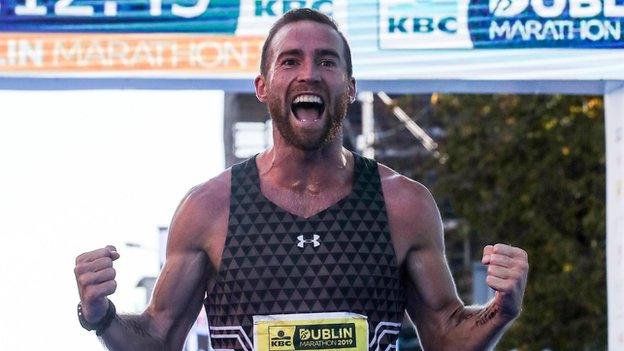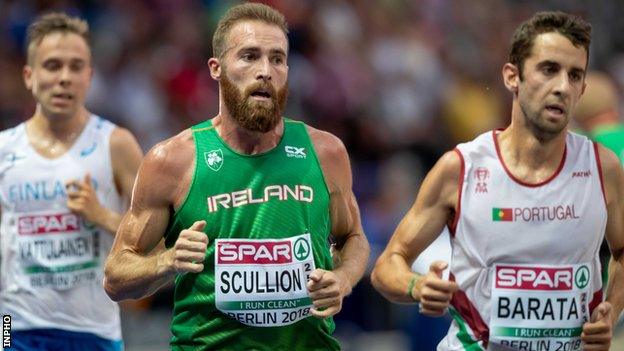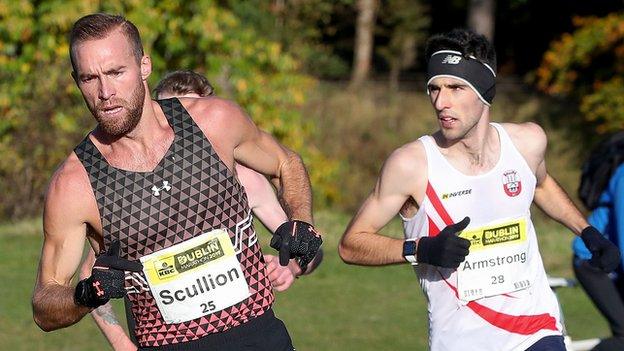Stephen Scullion's marathon journey: Retirements, returns and Tokyo ambitions
- Published

Stephen Scullion achieved Olympic qualification in Houston earlier this year but his Tokyo spot is not yet secured
"My psychology really struggles to stay motivated and focused. Whereas other guys love training, I've always had to battle with it.
"Could I be doing something else? I'm know how talented I am at athletics but I'm also talented at other things in life and could go on and do brilliant things in other areas."
Stephen Scullion should have been about to jump on a plane to a pre-Olympics holding camp but instead on this Wednesday morning he's at the Mary Peters Track - ostensibly to talk about competing at Down Royal Racecourse on 18 July.
The conversation soon becomes a marathon in itself as he recalls the torment and triumphs of an athlete regarded by many as the most talented of the trio of Northern Ireland distance runners who have qualified for Tokyo with Paul Pollock and Kevin Seaward also having achieved the feat.
As a 21-year-old, Scullion qualified for the 2010 Commonwealth Games only for a back injury to finally put paid to his hopes of representing Northern Ireland in the 1500m in Delhi.
Ann-Marie McGlynn will join Stephen Scullion in the event at Down Royal Racecourse on Saturday when competitive athletics returns to Northern Ireland
'I dabbled with the sport then'
"I dabbled with the sport then. I was in and out. I went to the European Indoors in 2013. Made the European Cross Country at the end of 2013.
"Then at a Cross Country race in 2014, it was pissing down with rain. The course was muddy and I tripped half way around the race.
"My friends that weekend were off to Portugal to play golf. I just remember thinking: 'You don't have to do this'. I took the best part of a year and a half off."
The sight of the Rio Olympics marathon standard being announced as two hours and 19 minutes in 2015 led to a rethink and Scullion spent our winter and spring Down Under being coached by Sonia O'Sullivan's husband Nic Bideau.
"It's a fact I would have run the qualifying time in 2016 only I tore my quad 10 days before the London Marathon. I was flying. It was the best fitness I've felt even to this day," insists Scullion, who in agony battled to the finish line in 2:20.39, before promptly deciding to quit the sport again.
"I remember sitting in the wee tent in London afterwards, just happy I was free because I knew I wasn't going to run anymore."

Scullion's decision to run the 10,000m and not the marathon at the 2018 European Championships in Berlin came in for some criticism
'My mental health had fallen apart'
A stint playing rugby for Belfast club CIYMS followed in 2016 with his application not quite as diligent as it had been in Australia.
"Before the games, there would be guys smoking, eating chow mein and all the rest of it and I was thinking, 'this isn't sport as I know it but it's fun'.
"I was an unprofessional as everybody but by December/January, my mental health had fallen apart.
"I could quit as a professional runner but I needed the routine and the joy you get from running."
Scullion's "party lifestyle" had led to him moving up from 68 kilos to around 85 so there was work to be done.
"My first run back was 13 miles at six-minute 30 mile pace round Richmond and even I thought 'that's ridiculous'. Everybody else talks about taking a month off and when they come back they can barely run."
Within 12 weeks, he was back at the London Marathon running an astonishing time of 2:17.59 given where he had come from which bettered the World Championship standard by over a minute but was 59 seconds shy of the mark set by Athletics Ireland.
Twelve months later, a personal best of 2:15.55 in London secured him a European Championship vest but he opted to run the 10,000m in Berlin, which led to criticism, amid suggestions his decision had affected Ireland's marathon team medal chances.
"I thought it might be the only opportunity I would have to run a championship track race. I could walk into that stadium and just see the crowd and it was amazing."
Runs Dublin three weeks after Doha
By January last year, it was marathon time again in Houston, after a stint at his by now regular Californian training base of Flagstaff, and despite a wrong turn in Texas which cost him over a minute, managed to reduce his personal best to 2:14.34.
That secured qualification for the World Championships marathon in Doha where he suffered like the vast majority of distance athletes in sweltering conditions amid the flawed decision to hold the global event in Qatar as he clocked 2:21.31 to place 43rd.
Incredibly Scullion was back on a marathon startline three weeks later in Dublin as he went on to cut more than two minutes off his PB with a sensational 2:12.01 clocking which left him second overall behind Moroccan Othmane El Gourmi, who had returned to athletics nine months earlier after a two-year ban for biological passport irregularities.
"Everybody kept telling me before Dublin, 'you're going to get tired at mile 20' and I was the only one thinking, 'what the hell are you talking about'."
While Scullion's time was the fastest Irish male marathon performance in 17 years and broke Greg Hannon's 40-year-old Northern Ireland record, it still remained 31 seconds outside the Tokyo Olympic standard which had been stiffened considerably since Rio.

Scullion is one of three Irish male runners to achieve an Olympic standard but athletes including Hugh Armstrong (right) will have further opportunities to put themselves in the Tokyo reckoning
Scullion produces Houston heroics
But Scullion's return to Houston six months ago was to prove the day when his prized Olympic qualification was achieved - although lockdown and the subsequent postponement of the Tokyo Games to 2021 means Scullion's berth in Ireland's three-strong marathon line-up is not yet sealed.
Amid windy and cold conditions in Texas, the 31-year-old showed remarkable resolve to improve his personal best to 2:11.52 and achieve the top-five finish which - in one of the world's elite Gold Label marathons - was deemed as Olympic qualification.
Scullion fell one second short of overhauling Kenyan-born Bahrain athlete Benson Seurei and agonising minutes dragged before his fifth place was confirmed.
"I had never even thought top five was a possibility. There were 12 people quicker than me and quite a few a lot quicker - 2:05 to 2:09 guys.
"After the finish line, it went from thinking 'I'm gonna have to do all this again and hope the weather's better' into a lovely moment."
The caveat around Scullion's Olympic place is that his fellow Northern Irishmen Seaward (2:10.10) and Pollock (2:10.25) are now both over a minute faster on the clock with Sean Tobin, yet to run a marathon, expected to be among chasing the standard of 2:11.30 when the qualifying window opens again in December.
Lockdown spent at home in Belfast
Scullion will bide his time before deciding whether deciding on his next marathon which could be one of loaded Spanish events where Pollock and Seaward achieved their Olympic marks despite finishing 18th and 24th respectively.
"Seville looked like a Park run-like finish with a line of guys running 2:10. Something I'd never seen before. It was crazy.
"Maybe that's the next step but the chances of making prize money or getting appearance fees at somewhere like Valencia is 'good luck' really because they are not going to pay 2:11 runners when they have 25 guys who ran 2:11 the year before."
Scullion returned home from California to be close to parents Gillian and Mark and other family members amid the onset of coronavirus in March and worked out alone on his old training routes of times past before joining up with coach Mark Kirk's group since lockdown was eased.
But it's hard to keep the mind from wondering about how the next 12 months are going to pan out.
"If I was told that over the next two years, there were going to be no big city marathons and no Olympics, I don't know that I would want to keep being a runner.
"And is it going to be a closed stadium Olympics with no fans? Is that what you pictured when you dreamt of going to an Olympics?
"It's been tough but athletes are fighters and even if it's your own psychology that's trying to F you up, you fight back and you say, 'no,no..hang in there'."